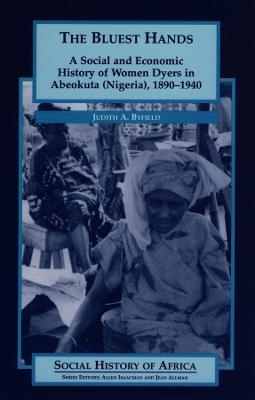
The Bluest Hands
A Social and Economic History of Women Dyers in Abeokuta (Nigeria), 1890-1940
Seiten
2002
James Currey (Verlag)
978-0-85255-600-9 (ISBN)
James Currey (Verlag)
978-0-85255-600-9 (ISBN)
- Titel ist leider vergriffen;
keine Neuauflage - Artikel merken
These women offer a rich tapestry of events and personalities that illustrate how colonialism transformed their lives and livelihood.
By the second decade of the twentieth century in Abeokuta, a Yoruba town in southwestern Nigeria, most dyers were producing adire cloth, which featured a variety of patterns created by resist dyeing with indigo onto a primarily European manufactured cloth. The author highlights the dynamic way in which these women engaged with the colonial economy, taking full advantage of its infrastructure and credit, as well as the new technologies and the availability of imported European cloth. Reveals how the women dyers constantly adapted to changes in the market, technology, political and economic conditions, consumer tastes and competition from other imported goods so that the industry not only survived but thrived as the town of Abeokuta was increasingly incorporated into the international economy.
North America: Heinemann
By the second decade of the twentieth century in Abeokuta, a Yoruba town in southwestern Nigeria, most dyers were producing adire cloth, which featured a variety of patterns created by resist dyeing with indigo onto a primarily European manufactured cloth. The author highlights the dynamic way in which these women engaged with the colonial economy, taking full advantage of its infrastructure and credit, as well as the new technologies and the availability of imported European cloth. Reveals how the women dyers constantly adapted to changes in the market, technology, political and economic conditions, consumer tastes and competition from other imported goods so that the industry not only survived but thrived as the town of Abeokuta was increasingly incorporated into the international economy.
North America: Heinemann
Introduction - Dress & textile production in nineteenth-century Abeokuta - 'The King of England was their Wall': state & society during the early colonial period - Artisans & empire: the structure & organization of adire production - Innovation & conflict in the adire history - Does father know best? Confronting the alake - The collapse of the adire industry, 1937-1939 - Conclusion
| Erscheint lt. Verlag | 16.5.2002 |
|---|---|
| Reihe/Serie | Social History of Africa |
| Zusatzinfo | 9 b/w, 2 line illus. |
| Verlagsort | Oxford |
| Sprache | englisch |
| Maße | 142 x 227 mm |
| Themenwelt | Geschichte ► Teilgebiete der Geschichte ► Kulturgeschichte |
| Geschichte ► Teilgebiete der Geschichte ► Sozialgeschichte | |
| Geschichte ► Teilgebiete der Geschichte ► Wirtschaftsgeschichte | |
| Sozialwissenschaften ► Soziologie ► Gender Studies | |
| ISBN-10 | 0-85255-600-4 / 0852556004 |
| ISBN-13 | 978-0-85255-600-9 / 9780852556009 |
| Zustand | Neuware |
| Haben Sie eine Frage zum Produkt? |
Mehr entdecken
aus dem Bereich
aus dem Bereich
der stille Abschied vom bäuerlichen Leben in Deutschland
Buch | Hardcover (2023)
C.H.Beck (Verlag)
CHF 32,15
vom Mittelalter bis zur Gegenwart
Buch | Softcover (2024)
C.H.Beck (Verlag)
CHF 16,80


